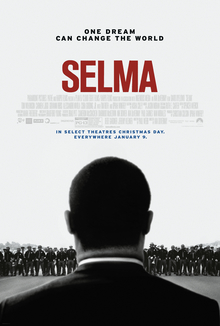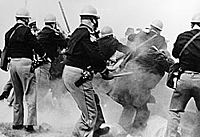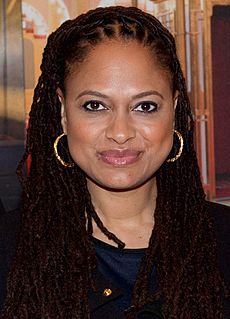Selma (film) facts for kids
Quick facts for kids Selma |
|
|---|---|

Theatrical release poster
|
|
| Directed by | Ava DuVernay |
| Produced by |
|
| Written by |
|
| Starring |
|
| Music by | Jason Moran |
| Cinematography | Bradford Young |
| Editing by | Spencer Averick |
| Distributed by |
|
| Release date(s) | November 11, 2014 (AFI Fest) December 25, 2014 (United States) |
| Running time | 128 minutes |
| Country |
|
| Language | English |
| Budget | $20 million |
| Money made | $66.8 million |
Selma is a 2014 historical drama film. It was directed by Ava DuVernay and written by Paul Webb. The movie tells the story of the Selma to Montgomery marches in 1965. These marches were a big part of the Civil Rights Movement in the United States.
The film shows how Dr. Martin Luther King Jr., Hosea Williams, and John Lewis led people to demand their right to vote. David Oyelowo plays Martin Luther King Jr. Other stars include Tom Wilkinson as President Lyndon B. Johnson and Tim Roth as Governor George Wallace.
Selma was first shown at the American Film Institute Festival in November 2014. It was released to more theaters in January 2015. This was just two months before the 50th anniversary of the real marches.
The movie was nominated for "Best Picture" at the 87th Academy Awards. It won an Oscar for Best Original Song for "Glory." It also won a Golden Globe for the same song.
Contents
What the Movie is About
The movie begins in 1964. Dr. Martin Luther King Jr. receives the Nobel Peace Prize. Soon after, a terrible bomb attack kills four young girls in a church in Birmingham, Alabama. This shows the danger and unfairness faced by Black people.
In Selma, Alabama, a woman named Annie Lee Cooper tries to register to vote. But a white official stops her. Dr. King meets with President Lyndon B. Johnson. He asks for a new law to make it easier for Black citizens to vote. President Johnson says he has other important things to do first.
King then travels to Selma with other civil rights leaders. They include Ralph Abernathy and Andrew Young. They plan to help Black residents register to vote. The FBI director, J. Edgar Hoover, tells President Johnson that King is causing trouble.
King and other leaders march to the voter registration office. Police push the crowd, and Annie Lee Cooper fights back. She and King are arrested.
Alabama Governor George Wallace speaks against the movement. Malcolm X meets with King's wife, Coretta Scott King. He suggests his strong views might make white people want to support King.
Later, state troopers attack a night march in Marion, Alabama. A young man named Jimmie Lee Jackson is shot and killed. King speaks at the morgue, asking people to keep fighting for their rights.
The Selma to Montgomery Marches
The first Selma-to-Montgomery march begins. Leaders like John Lewis and Hosea Williams cross the Edmund Pettus Bridge. State troopers block their way. The troopers attack the marchers with clubs, horses, and tear gas. Many, including Lewis, are badly hurt. This attack is shown on national television. It shocks people across the country.
A lawyer for the movement asks a judge to let another march happen. President Johnson tries to get King and Governor Wallace to stop. Many white Americans, like Viola Liuzzo and James Reeb, come to Selma to join the second march.
The marchers cross the bridge again. This time, the troopers move aside. King, after praying, decides to turn the marchers around. He does this to follow the judge's orders and avoid more violence. That evening, James Reeb is attacked and killed by a white mob in Selma.
After a court hearing, the judge allows the march to continue. President Johnson then speaks to Congress. He asks them to quickly pass a new law to protect voting rights. This law is called the Voting Rights Act of 1965.
The final march to Montgomery takes place. When they arrive, Dr. King gives a powerful speech on the steps of the Alabama State Capitol.
Main Characters
- David Oyelowo as Martin Luther King Jr.
- Carmen Ejogo as Coretta Scott King
- Oprah Winfrey as Annie Lee Cooper
- Tom Wilkinson as President Lyndon B. Johnson
- Common as James Bevel
- Lorraine Toussaint as Amelia Boynton Robinson
- Tim Roth as Governor George Wallace
- Nigél Thatch as Malcolm X
- Cuba Gooding Jr. as Fred Gray
- Alessandro Nivola as John Doar
- Dylan Baker as J. Edgar Hoover
- Stephan James as John Lewis
- Wendell Pierce as Hosea Williams
- André Holland as Andrew Young
- Tessa Thompson as Diane Nash
- Colman Domingo as Ralph Abernathy
- Ledisi Young as Mahalia Jackson
- Jeremy Strong as James Reeb
- Tara Ochs as Viola Liuzzo
- Martin Sheen as Judge Frank Minis Johnson (uncredited)
How the Movie Was Made
The idea for Selma started in 2008. Paul Webb wrote a story about Martin Luther King Jr. and President Lyndon B. Johnson. At first, other directors were considered. But in 2013, Ava DuVernay became the director.
DuVernay worked on the script with Paul Webb. She rewrote much of it. She had to write new speeches for Dr. King. This was because the rights to his original speeches were owned by other movie companies. DuVernay listened to King's speeches for many hours. She tried to capture his special way of speaking.
In 2014, Oprah Winfrey joined as a producer. Paramount Pictures agreed to release the movie in the US and Canada.
Choosing the Actors
[[multiple image | align = left | image1 = David Oyelowo February 2015.jpg | width1 = 155 | alt1 = | caption1 = | image2 = Tom Wilkinson.jpg | width2 = 158 | alt2 = | caption2 = | footer = Actor David Oyelowo (L), who played Martin Luther King Jr., and Tom Wilkinson (R), who played President Lyndon B. Johnson ]] In 2010, it was decided that David Oyelowo would play Dr. King. Many of the main roles, including King's wife, President Johnson, and Governor Wallace, were played by British actors.
In 2014, more actors joined the cast. Tom Wilkinson was chosen to play President Johnson. Carmen Ejogo played King's wife, Coretta Scott King. Oprah Winfrey also acted in the movie, playing Annie Lee Cooper.
Filming Locations

Filming for Selma began in May 2014. It took place in and around Atlanta, Georgia. Scenes were also shot in Selma and Montgomery, Alabama. These locations were important because they were where the real historical events happened. For example, scenes were filmed on the Edmund Pettus Bridge in Selma, where the "Bloody Sunday" attack took place.
Movie Music
Jason Moran created the music for the film. This was his first time composing for a movie. Common, who plays James Bevel in the movie, and John Legend wrote a song called "Glory". This song was released in December 2014. "Glory" is a protest song that talks about the fight for civil rights. It won both a Golden Globe and an Oscar for Best Original Song.
Release of the Movie
Selma was first shown at the AFI Fest in Los Angeles in November 2014. It received a standing ovation, meaning the audience clapped for a long time while standing up. The movie was released in a few US cities on December 25, 2014. It then opened in more theaters on January 9, 2015.
The film was shown again in March 2015 to celebrate the 50th anniversary of the historical march. It was also re-released in January 2021 for Black History Month. The movie became available on Blu-ray and DVD in April 2015.
Is the Movie Historically Accurate?
People have discussed how accurate Selma is. Some felt it left out certain people or groups who were part of the Selma marches. Others questioned how some historical figures were shown.
A lot of the discussion was about how President Johnson and his relationship with Dr. King were shown. Some people, like historian Mark Updegrove, said the movie made President Johnson seem like he didn't want to help King. They said he was actually a strong supporter of civil rights.
Andrew Young, a civil rights activist, said that the movie got almost everything right. He said the only thing he would question was how Johnson and King's relationship was shown. He said they always respected each other.
Director Ava DuVernay and US Representative John Lewis, who was in the real marches, both said that Selma is a work of art, not a documentary. DuVernay said she was a storyteller, not a historian. Lewis wrote that people don't expect other historical movies to be perfectly complete, so why should this one be?
A study that looked at 18 movies based on true stories gave Selma a perfect score of 100%. This means every scene was seen as "True" or "True-ish." The study said the movie carefully showed events as they happened and included everyone who was involved.
See also
 In Spanish: Selma (película) para niños
In Spanish: Selma (película) para niños
- Civil rights movement in popular culture
- Civil rights movement
- List of black films of the 2010s
- Selma, Lord, Selma


